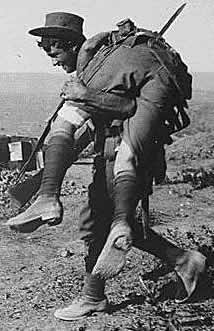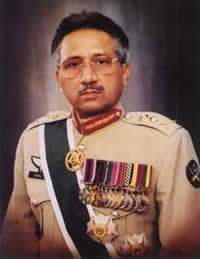 Australian and New Zealand leaders led tributes Thursday to the 10,000 soldiers from their nations who died 90 years ago this month in one of the bloodiest battles of World War I. They also laid to rest the remains of five recently found soldiers.
Australian and New Zealand leaders led tributes Thursday to the 10,000 soldiers from their nations who died 90 years ago this month in one of the bloodiest battles of World War I. They also laid to rest the remains of five recently found soldiers.New Zealand Prime Minister Helen Clark and Australia Gov. General Michael Jeffery led the commemorations, laying wreaths and honoring those who fell as part of the regiments that fought at the Battle of Passchendaele. Clark said the battle was the single most deadly that New Zealand soldiers have ever fought. "For New Zealand, Oct. 12, 1917, at Passchendaele ranks as our worst-ever military disaster in terms of lives lost on a single day," she said. "It is those brave men we remember and honor today."
Jeffery said the soldiers faced some of the most gruesome conditions armies have ever seen. "It's hard to even imagine the horror and devastation of fighting on the Western Front — shell, gas, machine guns and barbed wire," he said.
As part of the ceremonies, the bodies of five Australian soldiers that were found near the village of Passchendaele last year were reburied at Buttes Military Cemetery, one of many Commonwealth gravesites that dot Flanders Fields. The remains were discovered during a dig for a gas pipeline near to what was believed to have been a temporary World War I gravesite. Using DNA samples and historical research, two of the five sets of remains were identified as those of Pvt. John Hunter and Sgt. George Calder. Officials could not identify the other three. A contingent from Australia's 51st Battalion formed an honor guard at the reburial.
Clark and Jeffery led commemorations at Tyne Cot military cemetery — the largest Commonwealth military burial site in the world, located just outside Passchendaele. There are 12,000 graves and 35,000 names of missing persons engraved on memorial walls at Tyne Cot which is situated on a ridge captured by Australian forces during the battle in 1917. It overlooks the nearby city of Leper that was better known to the soldiers of 1914-18 by its French name, Ypres.
The July to November 1917 battle, described by historians as one of the bloodiest trench warfare fights during the war, pitted British-led forces from across its empire, including soldiers from Canada and other former colonies, against Germany. After the fighting ended, 500,000 soldiers were either dead, wounded or missing. The battle was called to a halt after Canadian reinforcements replaced devastated British, Australian and New Zealand units near Passchendaele and captured the ruined village on Nov. 10, 1917.

 CHINA has allegedly tried to hack into highly classified government computer networks in Australia and New Zealand as part of a broader international operation to glean military secrets from Western nations.
CHINA has allegedly tried to hack into highly classified government computer networks in Australia and New Zealand as part of a broader international operation to glean military secrets from Western nations. While Miss Clark knew which countries were involved, she would not name them, saying her Government had not spoken to the nations concerned about the problem. "That's not the way intelligence matters are handled," she said.
While Miss Clark knew which countries were involved, she would not name them, saying her Government had not spoken to the nations concerned about the problem. "That's not the way intelligence matters are handled," she said. WELLINGTON (Reuters) - Former central bank governor Don Brash appeared on course to upset
WELLINGTON (Reuters) - Former central bank governor Don Brash appeared on course to upset  Pakistan President Gen. Pervez Musharraf said Friday he has proposed nuclear disarmament with India to ensure peace and stability between the nuclear-armed neighbours. Gen Musharraf said Pakistan had gone "much further" than proposing a no first-strike nuclear policy in order to build confidence between the South Asian rivals. "We have suggested (nuclear) disarmament and reduction of forces," he said. Pakistan also opposes nuclear proliferation and was "against any other country acquiring nuclear weapons," he told reporters after talks with
Pakistan President Gen. Pervez Musharraf said Friday he has proposed nuclear disarmament with India to ensure peace and stability between the nuclear-armed neighbours. Gen Musharraf said Pakistan had gone "much further" than proposing a no first-strike nuclear policy in order to build confidence between the South Asian rivals. "We have suggested (nuclear) disarmament and reduction of forces," he said. Pakistan also opposes nuclear proliferation and was "against any other country acquiring nuclear weapons," he told reporters after talks with